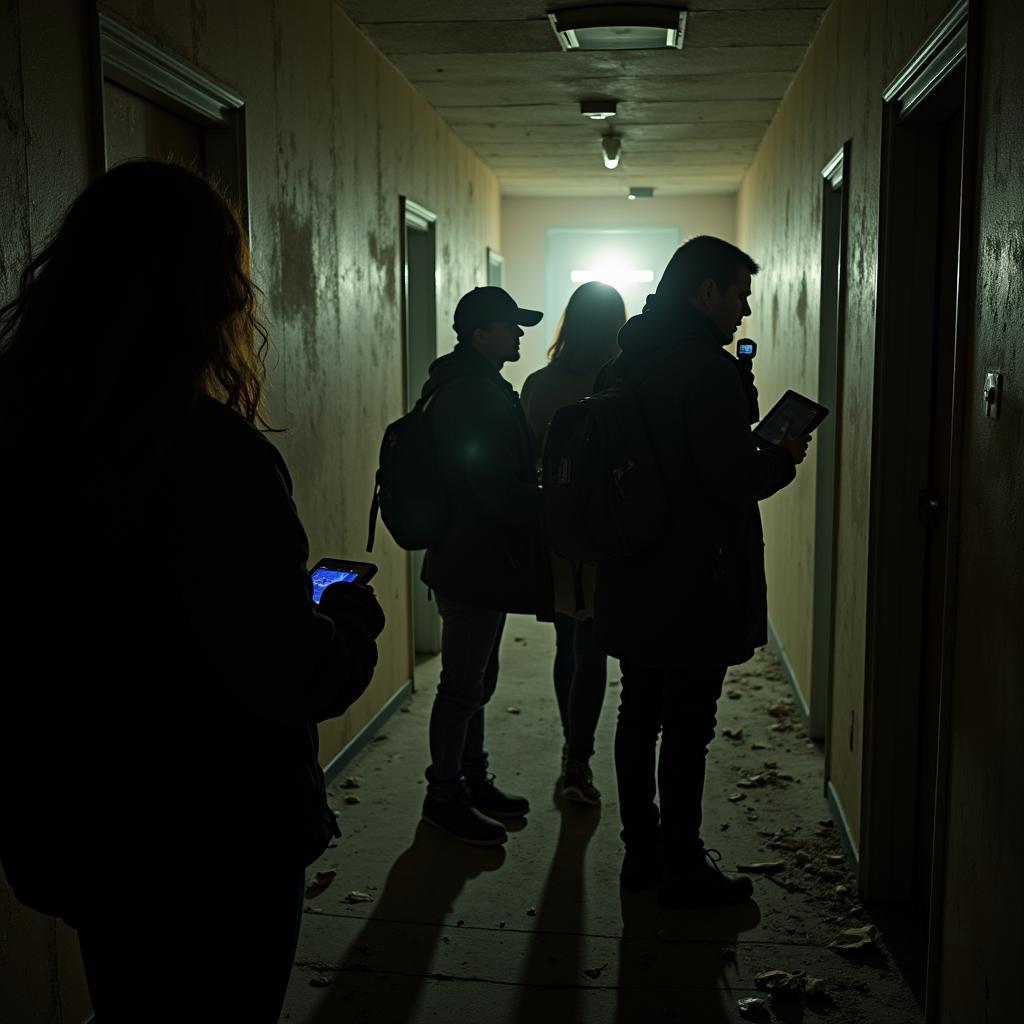Research Roles are essential in any field, from the scientific to the supernatural. Whether you’re investigating a new medical treatment or the existence of ghosts, understanding the different research roles is crucial for success.  Paranormal Research Team Investigating a Haunted Location The world of paranormal investigation, much like any other scientific discipline, relies heavily on structured research and dedicated individuals fulfilling specific roles.
Paranormal Research Team Investigating a Haunted Location The world of paranormal investigation, much like any other scientific discipline, relies heavily on structured research and dedicated individuals fulfilling specific roles.
Delving into Different Research Roles
Research roles can vary significantly depending on the field. In traditional academic settings, you have principal investigators, research assistants, and data analysts. clinical research roles But in the realm of the paranormal, the lines can blur. You might have a team leader, a psychic medium, a tech specialist, and a historian, each playing a vital role in the investigation. Each individual contributes their unique expertise to uncover the truth behind unexplained phenomena. Imagine investigating a haunted house. The tech specialist might set up recording equipment to capture EVPs (electronic voice phenomena), while the medium attempts to communicate with any spirits present. The historian could research the history of the location, looking for clues that might explain the paranormal activity. The team leader coordinates these efforts, ensuring a structured and thorough investigation.
What are the Key Research Roles in Paranormal Investigations?
While specific roles may vary based on the nature of the investigation, there are several key research roles frequently found in paranormal research teams. These include the Lead Investigator, who oversees the entire investigation; the Evidence Technician, responsible for collecting and analyzing data; the Researcher, who delves into historical records and local lore; and the Psychic/Medium, who provides intuitive insights and attempts communication with potential entities. Each role is crucial, offering a unique perspective and skillset to the investigation.
The analysis of collected data is a crucial aspect of any paranormal investigation. It’s not enough to simply collect data; it must be carefully examined and interpreted to draw meaningful conclusions.
The Importance of Collaboration in Research Roles
No matter the field, successful research depends on effective collaboration. Clear communication and a shared understanding of each team member’s role are crucial. This is especially true in paranormal research, where investigations often involve complex and ambiguous data. va research jobs Imagine a team investigating a supposed UFO sighting. The tech specialist might capture footage of an unusual object in the sky. The researcher could investigate reports of similar sightings in the area. And the team leader would collate all the information, working with the other team members to determine the most likely explanation. This collaborative effort allows the team to approach the phenomenon from multiple angles, increasing the chances of reaching a valid conclusion.
How to Find the Right Research Role for You?
Finding the right research role requires careful self-assessment and consideration of your interests and skills. Are you drawn to the technical aspects of data collection and analysis? Perhaps a role as an Evidence Technician would be a good fit. If you have a keen interest in history and folklore, a Researcher position might be more suitable. It’s important to match your strengths and passions with the demands of the role.
Effective communication and collaboration are essential for success in any research endeavor, especially in the often complex and challenging field of paranormal investigation. Teamwork allows for a diverse range of perspectives and skills to be brought to bear on the mysteries at hand.
Conclusion: The Future of Research Roles
Research roles continue to evolve, particularly with the increasing use of technology. As our understanding of the world, both seen and unseen, expands, so too will the demand for skilled researchers. cover letter research sample Whether you’re interested in clinical research, clinical research coordinator roles or exploring the unexplained, understanding the various research roles and their importance is key to unlocking the mysteries that surround us. Research roles play a critical role in advancing our knowledge and understanding in all fields of study. By embracing collaboration and staying abreast of new technologies, we can continue to push the boundaries of what we know and delve deeper into the mysteries that lie beyond.
Dr. Evelyn Ainsworth, a renowned paranormal investigator, notes, “Effective research in the paranormal field necessitates a multifaceted approach, combining scientific rigor with open-mindedness.” Similarly, Professor Alistair Blackwood, a leading expert in parapsychology, states, “Each research role, whether technical or intuitive, contributes a crucial piece to the puzzle of understanding the unknown.” Dr. Isabelle Moreau, a seasoned historian specializing in folklore and mythology, adds, “Historical context is essential for interpreting paranormal phenomena and separating genuine occurrences from cultural narratives.”
FAQ
- What qualifications are needed for paranormal research roles?
- What are the ethical considerations in paranormal research?
- How can I join a paranormal research team?
- What are some common misconceptions about paranormal research roles?
- Are there paid research roles in the paranormal field?
- What are the risks associated with paranormal research?
- What are some essential tools and equipment used in Paranormal Research?
Need help with your research? Contact us at Phone Number: 0904826292, Email: research@gmail.com Or visit us at No. 31, Alley 142/7, P. Phú Viên, Bồ Đề, Long Biên, Hà Nội, Việt Nam. We have a 24/7 customer support team. You can also explore these related articles: gender roles topics for research paper.